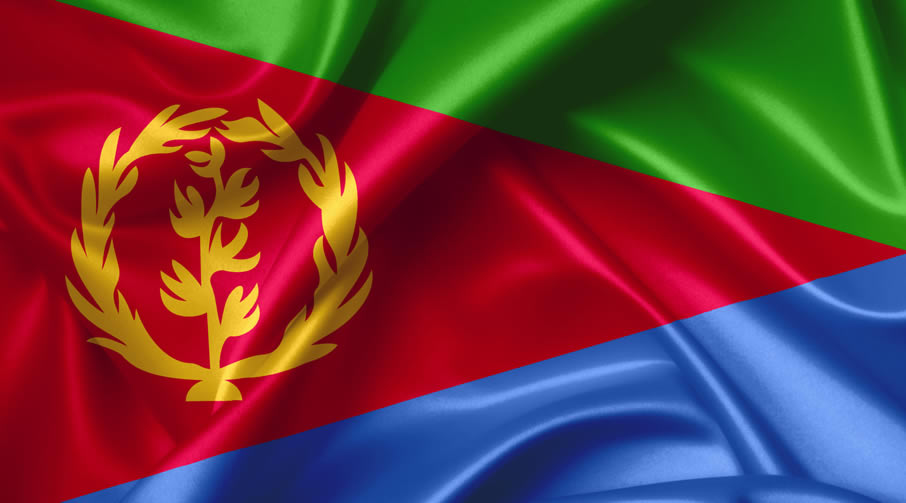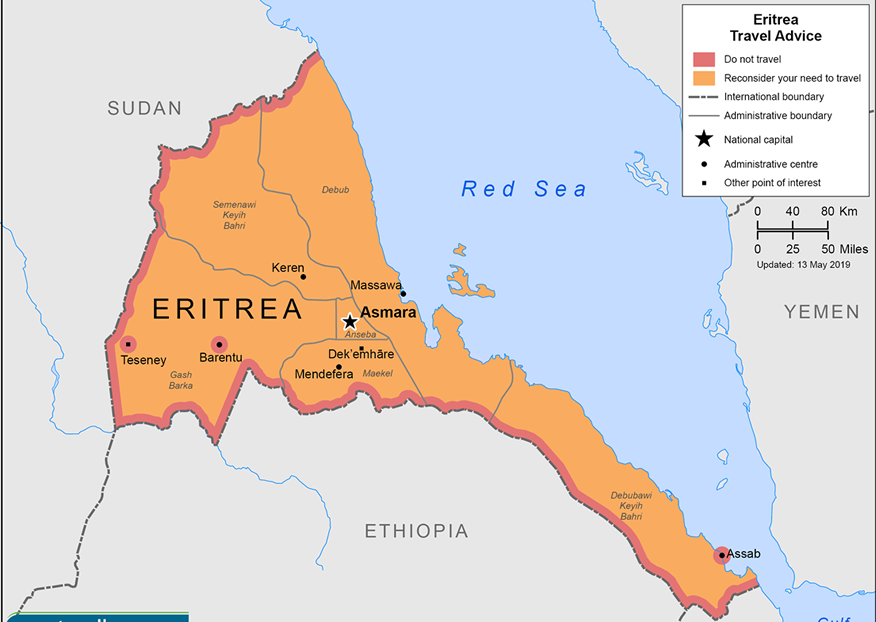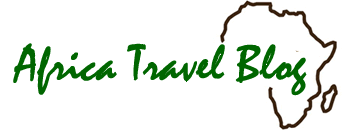Eritrea is a small East African nation situated off the Red Sea, north of Ethiopia, to the southeast of Sudan. The Country was a former Italian colony that was handed to Ethiopia in 1952. This caused a lengthy independence war which began in 1960 and ended in 1991. The war was fought between Ethiopian Government forces and pro-independence Eritrean Rebel forces.
Eritrea eventually gained its independence on the 24th of May 1993. Isaias Afewerki became the first president of the independent nation. He was one of the leading architects of the independence movement in Eritrea. The country was again involved in a short border war against Ethiopia between 1998 and 2000. The border dispute is yet to be fully resolved and a prominent United Nations Peacekeeping force is stationed along the country’s border with Ethiopia.
People & Culture
Eritrea has a population of approximately 4,786,994 people. The major ethnic groups in the country are; Tigre, Kunama, Afar, Saho and Tigrinya. Languages widely spoken in the country are; English, Tigrinya, Arabic, Tigre and Kunama.
Administration:
Asmara is the Capital City of Eritrea. For administrative purposes, the country is divided into six administrative regions known as Zobatat. These are; Anseba, Debub (Southern), Debubawi K’eyih Bahri (Southern Red Sea), Gash Barka, Ma’akel (Central), Semenawi Keyih Bahri (Northern Red Sea).
Flag of Eritrea:

The present day flag of Eritrea was adopted in 1995 as the flag of the independent nation. Eritrea had obtained its independence from Ethiopia in 1993.
The green color on the flag represents the rich agricultural land of Eritrea, blue for the ocean and the red triangle is for the blood spilt during the fight for independence. The yellow garland in the red triangle surrounds a golden olive branch which signifies peace.
Eritrea Government:
At present, Eritrea is a single party state and the only political party recognized by the Eritrean government is the People’s Front for Democracy and Justice (PFDJ). The party is headed by current Eritrean President Isaias Aferwerki. Changes to laws governing political parties in the country were proposed in 2001 and are yet to be debated.
The country’s current constitution was adopted in 1997. Eritrean citizens 18 years and over have the right to vote. The President is elected by the national assembly whose members are elected by popular public vote.
Administration:
With Asmara as its capital, Eritrea is divided into six administrative regions known as Zobatat. These regions each have their administrative headquarters. The regions are; Anseba, Debub (Southern), Debubawi K’eyih Bahri (Southern Red Sea), Gash Barka, Ma’akel (Central), Semenawi Keyih Bahri (Northern Red Sea).
Eritrea Currency:
The Eritrean Nakfa (ERN) is the title of the country’s currency. The currency has been in use since 1998 when it replaced the Ethiopian Birr following the independence of Eritrea.
Denominations:
One Eritrean Nakfa is equivalent to 100 cents. Coin denominations exist for 1, 5, 10, 25, 50 and100 cents. Banknotes exist for 1, 5, 10, 20, 50 and 100 Nakfa.
Exchange Rates against major currencies:
At the time of writing (June 2006), 1 $ US was equivalent to 15.00 Eritrean Nakfa, 1 British Sterling Pound was equivalent to 24.957 Nakfa and 1 Euro was equivalent to 16.99 Nakfa.
Key facts on Eritrea:
Eritrea Facts and Figures:
– Location: Eastern Africa, off the Red Sea, to the north of Ethiopia, east of Sudan.
– Capital City: Asmara.
– Population: 4,786,994.
– Other major towns and cities: Massawa, Tio, Keren, Akurdet, Nakfa, Kulul, Assab.
– Religion: Islam, Christian.
– Languages: Afar, Tigre, Tigrinya, Arabic, Kunama, English.
– Currency: Eritrean Nakfa (ERN).
Public Holidays in Eritrea:
General Public Holidays:
-New Year’s Day on the 1st of January,
-Woman’s Day on the 8th of March,
-Labour Day on the 1st of May,
-Independence Day on the 24th of May,
-Martyrs’ Day on the 20th of June,
-Revolution Day on the 1st of September,
-Christmas Day on the 25th of December.
Religious Holidays (dates vary each year):
-Orthodox Christmas
-Orthodox Epiphany
-Eid al Adha
-The Prophet’s Anniversary
-Orthodox Good Friday
-Orthodox Easter
-Meskel
-Eid al Fitr
Eritrea Map:

Health in Eritrea:
In comparison to other African nations, Eritrea has a relatively low HIV/AIDS prevalence rate. The disease is however still a major health problem and affects about 3 % of the population, with about 60,000 people living with the condition.
Food and water hygiene are also a problem and safe tap drinking water is hard to come by especially out of Asmara. Many shops however sell bottled mineral water. Hygiene related illnesses include; diarrhea, typhoid fever and hepatitis A. There is also a high risk of malaria in parts of the country and taking anti-malarial tablets is recommended prior to travel.
Hospitals:
Decent health care is hard to come by outside of Asmara. The City’s hospitals include; the Orota Referral Hospital, Sembel Hospital and the Edaga Hamus Hospital. There are also a number of small clinics and health centers.
The administering of medical services in the country has improved greatly since independence. In Asmara, there are a number of pharmacies and drug stores where you can purchase simple prescription medicines
People & Culture
Education in Eritrea:
The City of Asmara is the main educational center in Eritrea. The City is home to the sole university in the country and a host of specialist colleges and schools. Education standards in the country have improved greatly since its independence and there is a big increase in student enrolment and school completion rates.
Education in the country falls under the jurisdiction of the ministry of education which handles a variety of tasks such as; teacher recruitment and maintaining of education standards in Eritrea.
The University of Asmara established in 1954 is the main institute of higher learning in Eritrea. The University’s main campus and schools are situated at the nation’s capital and offer degree and diploma courses in arts, education, agriculture, law, engineering and business.
Food in Eritrea:
Foods readily available in Eritrea include; poultry, lentils, vegetables, maize, sorghum and fruits. The availability of fruits and vegetables at local markets depend on the season. Eritreans also keep livestock such as goat, cattle, sheep and pigs. Fresh seafood is also readily available and is usually gotten from the Red Sea.
Typical Eritrean dishes include stews or curries eaten together with Injera or other kinds of locally prepared breads. Injera is a pancake like bread made from cereal flour such as; wheat, maize, teff, barley or sorghum; sometimes a mixture of these.
Many people in Eritrean households traditionally eat food with their hands. Dishes can be served on a mat or stumpy table sometimes on a large plate for diners to share.
Asmara has the largest selection of restaurants in the country. The city is home to a number of restaurants serving a variety of cuisine such as; local dishes, Italian and American foods. Beer and wine are also available and there are a number of good bars in Asmara.
Sports in Eritrea:
Like most African nations, soccer is the most popular team sport in Eritrea. The national team regularly competes in regional and continental tournaments, though it is yet to qualify for the Africa Nations Cup or World Cup, not being able to get through the qualifiers.
As a newly independent nation, Eritrea is a recent entrant to the world sporting arena. The National Soccer team is known as the “Red Sea Boys”. Most home games are played at the Asmara Stadium. Local clubs also such as the Adulis Soccer Club participate regularly in regional and continental club competitions.
Other popular sports in Eritrea include; cycling, volleyball and athletics. Eritrea first participated at the Olympic Games in Sydney, Australia 2000. The team returned home without any medals but Eritrea again took part in the 2004 Athens Olympics. Zersenay Tadesse running in the 10,000 meters men’s race won Eritrea’s first medal (bronze), finishing 3rd.
Tourism and travel in Eritrea:
The ministry of tourism in Eritrea is charged with the task of promoting the country as a tourism destination. The ministry has implemented a number of marketing strategies and also encourages investment in the country’s tourism industry. There are a number of regular scheduled flights into the country from a number of destinations in Africa and Europe. Travel within the country is aided by decent bus and rail services.
The main tourism attractions in Eritrea are its nature reserves which are filled with an array of wildlife and interesting geographical formations. Popular attractions include:
Parks and Reserves: national parks and nature reserves such as Semenawi Bahri and the area encompassing the Danakil Depression have a variety of wildlife including; ostrich, monkey, elephant, lion, warthog, baboon, hartebeest, kudu, wild cat, jackal. The country is also blessed with a variety of bird species such as; parrots, hornbill, woodpeckers, canaries, sunbird, grouse, weavers, turtle dove, herons and stork.
The Dahlak Marine National Park: one of the feature attractions in Eritrea, this park is situated off the Eritrean mainland in the Red Sea. Here you will also find the Dahlak Archipelago which consists of over 300 small islands.
Beaches: some easily reachable from the Asmara city center, Eritrea’s beaches are unsoiled and feature expansive sandy areas and calm coastal waters. Popular beaches include; Mersa Ibrahim, Zula Bay, Buri Peninsula.
Transport in Eritrea:
The once reasonably extensive rail network in Eritrea is limited to a number of destinations from the capital Asmara. Public transport within towns and around the country consists mainly of buses and mini-buses operated by a number of private companies. The country has two important ports at Massawa and Assab which provide an avenue for import and export goods also serving interior landlocked nations.
Air Transport:
The Asmara International Airport situated at the outskirts of the city is the key airport in the country. The airport is the main hub for Eritrean Airlines which conducts domestic flights to the newly opened Massawa airport. The airline also operates regular flights to a number of international destinations including; Dubai, Nairobi, Amsterdam, Djibouti, Frankfurt, Milan and Rome.
Car Hire:
There are a number of car hire companies in the country and car rental in Eritrea is relatively affordable.
Communication in Eritrea:
Internet access:
Internet use in Eritrea is still limited to a small part of the country’s population. The development of the country’s internet infrastructure only experienced substantial growth in the 21st century.
Internet in Eritrea is mainly dial-up and is provided by a number of local ISPs. Internet cafes are available in the country’s capital Asmara and charge users by the minute or at hourly rates. Some of the larger hotels offer internet access to their clients.
Postal and Telecommunication services:
Postal and telephone services in the country are operated by government agencies under the ministry of communication.
Radio and Television in Eritrea:
There are no private media houses in Eritrea. The Country’s radio and television stations are run by the state. There is only one television station known as Eritrean Television (ERI-TV).
The station conducts news broadcasts in English, Arabic, Tigrinya and Tigre. The station also televises programs on local issues as well as local and foreign entertainment programs.
The country’s radio stations are Radio Zara which operates on FM frequencies and the Voice of the Masses of Eritrea (Dimtsi Hafash) which broadcasts programs in eleven different languages.
Print media:
Government monopoly also translates to print media. The Eritrean News Agency (Erina), is the sole news agency in the country. Newspapers published in the country are; Eritrea Profile, Tirigta, Geled and Hadas Eritrea.
Consular Services
Embassy Directory:
Eritrean Embassies in Asia and Oceania:
The Embassy of Eritrea in Australia:
The Eritrean embassy in Australia is situated at 26 Guilfoyle Street in Yarralumla, in the City of Canberra. For more information on the embassy and consular services, you can call: 61 6282 3489 or Fax: 61 6282 5233.
The Embassy of Eritrea in China:
The Eritrean embassy in China is situated at the Ta Yuan office building 2 10 1 , No.14, South Liang Mahe Road in Beijing. For more information on the embassy and consular services, you can call: 86 10 6532 6534 or Fax: 86 10 6532 6532.
Eritrean Embassies and Consulates in Europe:
The Embassy of Eritrea in the United Kingdom:
The Eritrean Embassy in the UK is situated at 96 White Lion Street in London. For more information on the embassy, cultural events and consular services in the United Kingdom, you can visit the embassy’s website at: http://eritrea.embassyhomepage.com/ or alternatively call; 020 7713 0096 or Fax: 020 7713 0161.
The Embassy of Eritrea in France:
The Eritrean embassy in France is located at 31-33, Rue Lecourbe in Paris which is the country’s capital. For more information on the embassy and consular services in France including opening hours and visa processing, you can call; (331) 4306 1556 or Fax: (331) 4306 0751.
The Embassy of Eritrea in Germany:
The Eritrean embassy in Germany is situated at StavangerstraAxe 18 in the city of Berlin. This consulate can be reached on: Tel: 030 4 467 460 or Fax: 0304 4 467 4621.
The Embassy of Eritrea in Italy:
The Eritrean embassy in Italy is situated at Via Boncompagni, 16 in the City of Rome. For information on the embassy, consular services including visa applications and travel advice, you can contact the embassy on Tel: 39 06 4274 1293 or Fax: 39 06 4208 5806.
The Embassy of Eritrea in Russia:
The Eritrean Embassy in Russia is situated at House no. 85 on Vavilova Street in Moscow. For more information on the embassy and consular services, you can call: 7 095 134 1578 or Fax: 7 095 134 1578.
Eritrean Embassies in the US and Canada:
The Embassy of Eritrea in the United States:
The Eritrean embassy in the United States is situated at 1708 New Hampshire Avenue in Washington DC. For more information on the embassy and consular services in the United States, you can call the embassy on: 1 202 319 1991 or Fax: 1 202 319 1304.
The Embassy of Eritrea in Canada:
The Eritrean embassy in Canada is situated at 75 Albert Street in Ottawa City. For more information on the embassy and consular services in Canada, you can call; (613) 234 3989 or Fax: (613) 234 6213.

